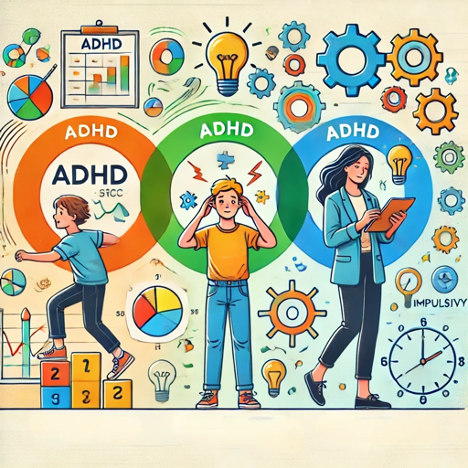Attention Deficit Hyperactivity Disorder (ADHD) is a neurodevelopmental condition that affects people throughout their lives. Although it is often associated with children, ADHD impacts individuals in unique ways as they progress through different life stages—from childhood to adolescence and into adulthood. In this blog, we’ll explore how ADHD manifests across the lifespan and the specific challenges and strengths that arise in each stage of life.
ADHD in Children
Childhood is when ADHD is most commonly diagnosed, with symptoms often becoming noticeable around age 6. The primary behaviors associated with ADHD in children include inattention, hyperactivity, and impulsivity. These symptoms can make it challenging for children to succeed in school, form relationships, and follow routines.
– Inattention: Children with ADHD often have trouble focusing on tasks that require sustained mental effort, such as completing schoolwork or following instructions. They may seem forgetful, easily distracted, or disorganized.
– Hyperactivity: Many children with ADHD display high levels of physical activity, such as fidgeting, running around, or climbing on things, even when it’s not appropriate.
– Impulsivity: ADHD can lead to difficulty with impulse control, resulting in children acting without thinking—interrupting others, blurting out answers in class, or engaging in risky behaviors.
Despite these challenges, children with ADHD are often creative, energetic, and eager to explore the world. Early diagnosis and intervention, such as behavioral therapy and educational support, can help children with ADHD thrive. Learn more about ADHD diagnosis in children from the ADHD UK.
ADHD in Teens
Adolescence can be a particularly challenging time for individuals with ADHD. During the teenage years, ADHD symptoms may evolve, with some symptoms becoming less prominent (like hyperactivity) and others intensifying, such as problems with focus, organization, and self-regulation.
Key challenges for teens with ADHD include:
– Academic Struggles: As schoolwork becomes more demanding, teens with ADHD often find it difficult to manage their time, stay organized, and complete assignments. This can lead to frustration, lower academic performance, and a higher risk of dropping out of school.
– Social Difficulties: ADHD can affect teens’ ability to form and maintain friendships. Impulsive behavior, difficulty reading social cues, or problems listening and focusing during conversations can lead to misunderstandings or social isolation.
– Emotional Regulation: The impulsivity and emotional dysregulation associated with ADHD may result in heightened emotional reactions, mood swings, and difficulty managing stress. This can increase the risk of mental health issues like anxiety and depression during the teenage years.
However, many teens with ADHD also excel in areas that align with their strengths, such as creative arts, sports, and hands-on activities. Supportive strategies like structured routines, ADHD coaching, and academic accommodations can make a significant difference in their success. For more information about ADHD in teens, check out this resource from CHADD.
ADHD in Adults
Contrary to the misconception that ADHD only affects children, many people continue to experience ADHD symptoms into adulthood. While hyperactivity may decrease over time, adults with ADHD often struggle with inattention, disorganization, and difficulties in both professional and personal aspects of life.
– Workplace Challenges: Adults with ADHD may find it difficult to focus on tasks, meet deadlines, or organize their workload. This can lead to stress in the workplace, lower job performance, or even job loss if ADHD symptoms are not managed effectively. However, many adults with ADHD are highly creative, innovative, and excellent problem-solvers, particularly in fast-paced environments.
– Relationships: ADHD can affect personal relationships, as forgetfulness, distractibility, and impulsivity can lead to misunderstandings or conflicts with partners, family, and friends. Effective communication and ADHD-specific couples counseling can help manage these challenges.
– Daily Life: Managing household tasks, finances, and other responsibilities can be overwhelming for adults with ADHD. Disorganization, procrastination, and poor time management are common struggles. Fortunately, cognitive-behavioral therapy (CBT), medication, and organizational tools can help adults with ADHD navigate daily life more effectively.
To learn more about ADHD in adulthood, visit this guide on adult ADHD.
ADHD Treatment Across the Lifespan
While ADHD presents differently at various stages of life, treatment is often necessary to help individuals manage their symptoms and lead fulfilling lives. Common ADHD treatments include:
– Medication: Stimulants such as Adderall and Ritalin remain effective across all age groups. These medications help improve focus, impulse control, and attention by increasing levels of dopamine and norepinephrine in the brain.
– Behavioral Therapy: Behavioral therapy, including parent training for children and cognitive-behavioral therapy (CBT) for teens and adults, can help individuals with ADHD develop strategies for managing symptoms and improving daily functioning.
– Coaching and Support: ADHD coaching can be beneficial, particularly for teens and adults, providing guidance on goal-setting, time management, and personal accountability.
For a full overview of ADHD treatment options, visit this ADHD treatment guide.
Conclusion
ADHD is a lifelong condition that affects people differently at each stage of life. Whether in childhood, adolescence, or adulthood, individuals with ADHD can face significant challenges, but they also possess unique strengths. With the right support, treatment, and understanding, individuals with ADHD can thrive at every stage of life.
For additional resources and support, check out the ADHD Awareness Month website for the latest information on ADHD across the lifespan.




